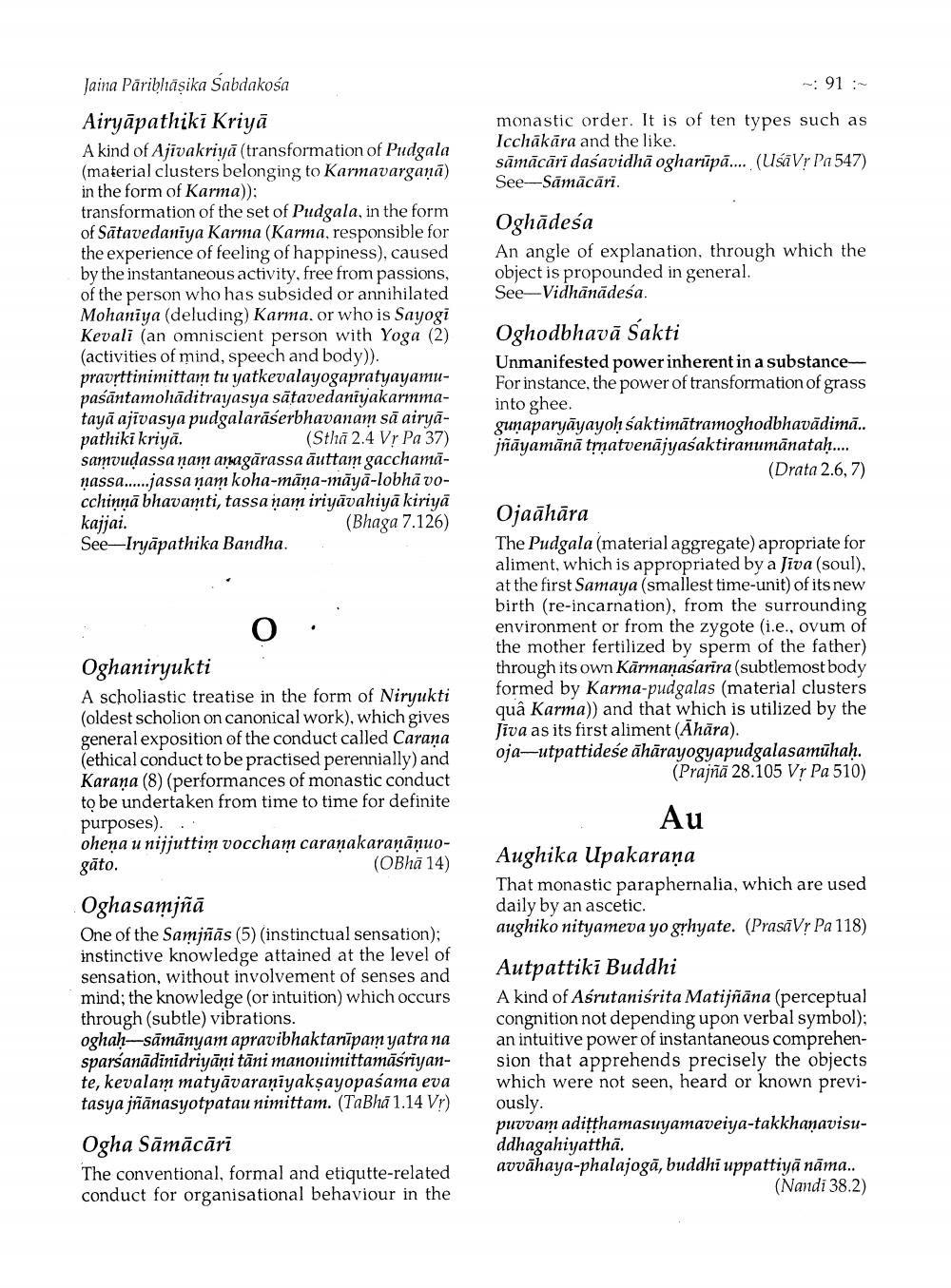________________
-: 91 :
monastic order. It is of ten types such as Icclākāra and the like. sāmācārī dasavidhā ogharupā.... (Usa Vr Pa 547) See-Sāmācāri.
Oghādesa An angle of explanation, through which the object is propounded in general. See-Vidhānādesa.
Jaina Pāribhäşika Sabdakosa Airyāpathiki Kriyā A kind of Ajivakriyā (transformation of Pudgala (material clusters belonging to Karmavarganā) in the form of Karma)); transformation of the set of Pudgala, in the form of Sātavedaniya Karma (Karma, responsible for the experience of feeling of happiness), caused by the instantaneous activity, free from passions, of the person who has subsided or annihilated Mohaniya (deluding) Karma, or who is Sayogi Kevali (an omniscient person with Yoga (2) (activities of mind, speech and body)). pravrttinimittam tu yatkevalayogapratyayamupasāntamohāditrayasya sātavedaniyakarmmatayā ajīvasya pudgalarāśerbhavanam sā airyapathiki kriyā.
(Sthā 2.4 Vr Pa 37) samvudassa ņam anagarassa āuttam gacchamanassa......jassa nam koha-māna-māyā-lobhā vocchinnā bhavamti, tassaņam iriyāvahiyā kiriya kajjai.
(Bhaga 7.126) See Iryāpathika Bandha.
Oghodbhavā Sakti Unmanifested power inherent in a substanceFor instance, the power of transformation of grass into ghee. gunaparyāyayoh saktimātramoghodbhavādimā.. jñāyamānā tratvenājyasaktiranumānataḥ....
(Drata 2.6,7)
Ojaāhāra The Pudgala (material aggregate) apropriate for aliment, which is appropriated by a Jiva (soul), at the first Samaya (smallest time-unit) of its new birth (re-incarnation), from the surrounding environment or from the zygote (i.e., ovum of the mother fertilized by sperm of the father) through its own Kārmanasarira(subtlemost body formed by Karma-pudgalas (material clusters quâ Karma)) and that which is utilized by the Jiva as its first aliment (Ahāra). oja-utpattidese āhārayogyapudgalasamühah.
(Prajna 28.105 VỊ Pa 510)
Oghaniryukti A scholiastic treatise in the form of Niryukti (oldest scholion on canonical work), which gives general exposition of the conduct called Caraņa (ethical conduct to be practised perennially) and Karana (8) (performances of monastic conduct to be undertaken from time to time for definite purposes). ohena u nijjuttim voccham caranakaraṇānuogāto.
(OBhā 14)
Oghasamjñā One of the Samjñās (5) instinctual sensation); instinctive knowledge attained at the level of sensation, without involvement of senses and mind; the knowledge (or intuition) which occurs through (subtle) vibrations. oghah-sāmānyam apravibhaktarūpam yatra na sparsanādinidriyāni tāni manonimittamāsriyante, kevalam matyāvaraṇīyakşayopasama eva tasya jñānasyotpatau nimittam. (TaBhā 1.14 Vr)
Au Aughika Upakarana That monastic paraphernalia, which are used daily by an ascetic. aughiko nityameva yo gyhyate. (PrasãV? Pa 118) Autpattiki Buddhi A kind of Aśrutanisrita Matijñāna (perceptual congnition not depending upon verbal symbol); an intuitive power of instantaneous comprehension that apprehends precisely the objects which were not seen, heard or known previously. puvvam aditthamasuyamaveiya-takkhanavisuddhagahiyatthā. avvāhaya-phalajogā, buddhi uppattiyā nāma..
(Nandi 38.2)
Ogha Sāmācārī The conventional, formal and etiqutte-related conduct for organisational behaviour in the




